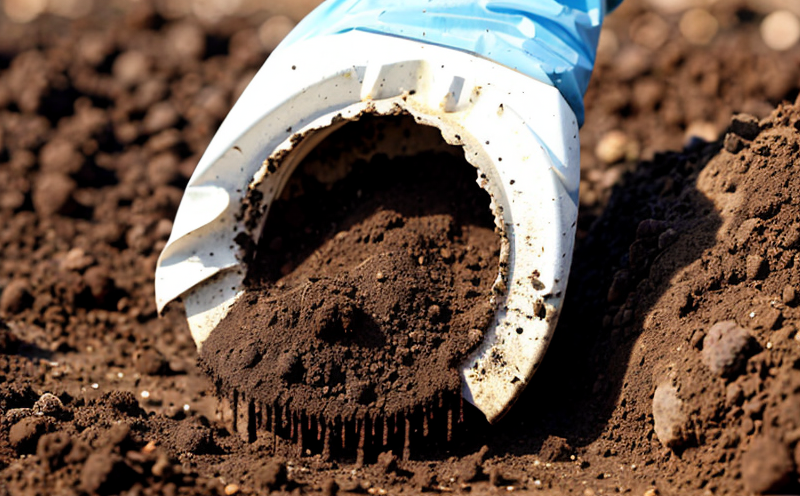ISO 10390 Soil pH Determination Test
The ISO 10390 standard provides a comprehensive method for determining the soil pH, which is crucial in understanding the chemical properties of soil and its potential impact on plant growth, environmental health, and construction practices. Soil pH can significantly influence the availability of nutrients to plants and the behavior of contaminants within the soil matrix.
Accurate measurement of soil pH ensures compliance with local regulations such as those enforced by the Environmental Protection Agency (EPA) in the United States or the Environment Agency in the UK. This test is essential for industries ranging from agriculture, where nutrient availability and crop health are critical, to construction, where environmental impact assessments are required.
The ISO 10390 standard specifies a method using a glass electrode pH meter with temperature compensation, which ensures that readings account for variations in temperature. The test involves dissolving a known amount of soil sample in distilled water and measuring the resulting solution's pH. This process requires meticulous preparation and handling to ensure accurate results.
For soil samples containing organic matter or high levels of salts, special considerations must be taken during preparation. In such cases, extraction methods like the fumic acid method (ISO 10392) may be more appropriate. The test procedure outlined in ISO 10390 is widely recognized for its reliability and accuracy.
Understanding soil pH is essential for various applications including:
- Evaluating the suitability of a site for construction projects
- Determining the effectiveness of remediation efforts in contaminated sites
- Assessing the impact of agricultural practices on local ecosystems
- Monitoring compliance with environmental regulations
The ISO 10390 method is widely used globally, ensuring consistent and comparable data across different regions. This standard plays a vital role in ensuring that soil samples are analyzed under controlled conditions, leading to more reliable and reproducible results.
While the test itself appears straightforward, achieving accurate results requires careful attention to detail. Factors such as sample homogeneity, proper washing of electrodes, and temperature calibration can greatly influence the final pH reading.
Industry Applications
The ISO 10390 Soil pH Determination Test is applicable across a broad spectrum of industries including agriculture, construction, environmental consulting, and waste management. In agricultural applications, accurate soil pH measurement helps farmers optimize nutrient application and improve crop yields.
In the context of construction projects, knowing the soil's pH can inform decisions regarding foundation design and material selection. High alkaline soils might necessitate specialized concrete mixes to prevent alkali-silica reaction (ASR), which can cause cracking in concrete structures.
For environmental consulting firms, this test is integral to comprehensive site assessments. It helps identify potential risks associated with contaminated sites by providing insights into how pH affects the mobility and bioavailability of contaminants like heavy metals or hydrocarbons.
In waste management, soil pH testing ensures that corrective actions taken during remediation efforts are effective in neutralizing acidic or alkaline conditions caused by waste disposal practices. This not only protects the environment but also prevents long-term damage to local ecosystems.
Eurolab Advantages
At Eurolab, we pride ourselves on offering a range of testing services tailored specifically to meet the needs of our clients. Our ISO 10390 Soil pH Determination Test is conducted by experienced technicians equipped with state-of-the-art equipment and facilities.
- Comprehensive Quality Assurance: We adhere strictly to international standards like ISO 10390, ensuring that all tests are performed under controlled conditions.
- Precision Equipment: Our pH meters and other analytical instruments are regularly calibrated to guarantee accurate readings.
- Expert Staff: Our team comprises highly trained professionals with years of experience in soil analysis, ensuring that every test is conducted with precision and care.
- Detailed Reporting: Results are presented in a clear and concise manner, complete with detailed explanations and recommendations based on the findings.
We understand the importance of timely delivery of accurate results. Our efficient workflow ensures that you receive your reports promptly, allowing you to make informed decisions swiftly.
International Acceptance and Recognition
The ISO 10390 Soil pH Determination Test is widely accepted across the globe due to its robust methodology and adherence to international standards. Here are some key points regarding its acceptance:
- American Society for Testing and Materials (ASTM): ASTM D2571-18, which aligns closely with ISO 10390, is used in the United States.
- Institute of Electrical and Electronics Engineers (IEEE): While IEEE standards are more focused on electrical engineering, they often harmonize with ISO standards for broader applicability.
- European Committee for Standardization (CEN): CEN/TC 46/WG10, which is part of the European standardization system, also aligns with the ISO 10390 methodology.
The widespread adoption of this test ensures that results are comparable and acceptable in various regulatory frameworks. This international recognition enhances confidence in our testing services and facilitates seamless compliance across different regions.





